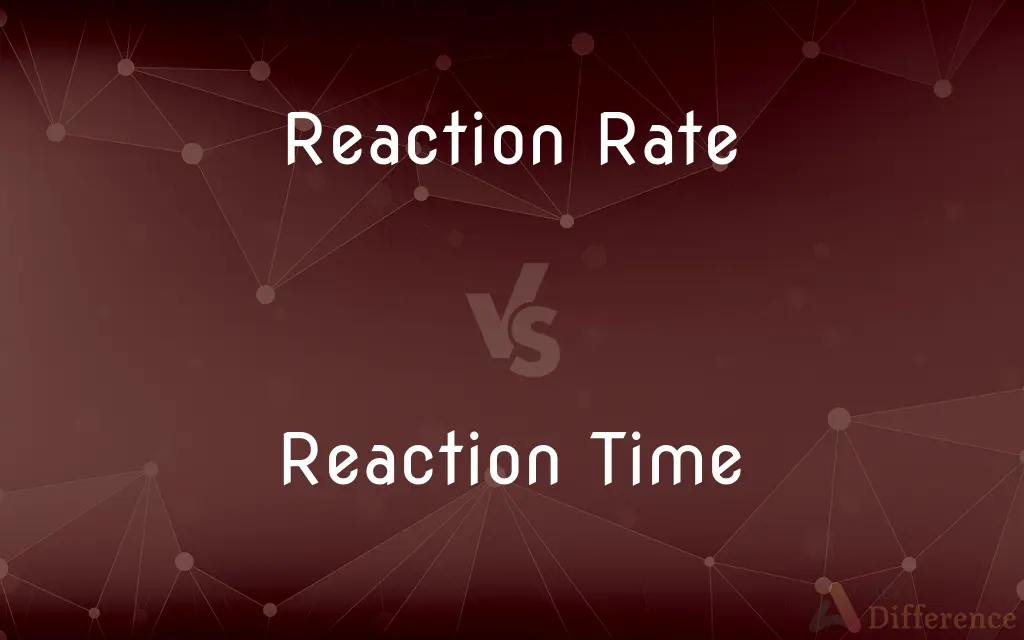Reaction Rate vs. Reaction Time — What's the Difference?
By Tayyaba Rehman — Published on October 30, 2023
Reaction Rate quantifies how quickly a reaction occurs, while Reaction Time refers to the duration taken for a process or event to complete.

Difference Between Reaction Rate and Reaction Time
Table of Contents
ADVERTISEMENT
Key Differences
Reaction Rate and Reaction Time, while related in the context of chemical reactions, differ fundamentally. Reaction Rate specifically measures how quickly a reaction progresses. For instance, in a chemical process, it might involve the speed at which a reactant decreases or a product forms.
Conversely, Reaction Time denotes the time span taken for a process or event to reach its completion. In a broader context, beyond just chemistry, Reaction Time might refer to the interval between a stimulus and the corresponding observable response, such as in human reflex tests.
Both terms, Reaction Rate and Reaction Time, are crucial in various scientific and real-world applications. Reaction Rate can influence the efficiency and feasibility of industrial processes, determining the production scale and costs. On the other hand, Reaction Time is often studied in fields like neuroscience and psychology, assessing human or animal responses to various stimuli.
In essence, while Reaction Rate evaluates the speed of a specific event or process, Reaction Time offers a measure of the duration from start to finish. When discussing chemical reactions, it's the distinction between how fast a reaction proceeds and the total time it takes to finish.
In many scenarios, a high Reaction Rate might lead to a short Reaction Time, especially in chemical contexts. However, this isn't universally true, as external factors, conditions, or even limiting reactants can impact both.
ADVERTISEMENT
Comparison Chart
Definition
Measures speed of reaction.
Denotes the duration taken for a process to complete.
Context
Typically chemistry.
Broad, including human reflex tests.
Units
Often concentration/time (e.g., mol/L·s).
Usually time (e.g., seconds, minutes).
Dependency
Dependent on factors like temperature and concentration.
Influenced by reaction rate and external conditions.
Field Relevance
Essential in chemical and industrial processes.
Relevant in neuroscience, psychology, and chemistry.
Compare with Definitions
Reaction Rate
It's quantifiable and can be graphically represented.
The graph depicted a linear increase in the Reaction Rate.
Reaction Time
Used to measure the interval between stimulus and response.
The test assessed the Reaction Time of drivers to sudden obstacles.
Reaction Rate
Reaction Rate can determine the feasibility of chemical processes.
The slow Reaction Rate rendered the process commercially unviable.
Reaction Time
Reaction Time indicates the duration from start to finish.
His Reaction Time to the stimulus was remarkably fast.
Reaction Rate
Reaction Rate measures the speed of a reaction.
The Reaction Rate of the enzyme-catalyzed process was impressive.
Reaction Time
In chemistry, refers to the total time for a reaction to complete.
The Reaction Time for the complete conversion was 5 minutes.
Reaction Rate
Describes how quickly reactants are consumed or products are formed.
The Reaction Rate showed a rapid formation of the product.
Reaction Time
Often assessed in cognitive and reflex tests.
Athletes undergo tests to optimize their Reaction Time.
Reaction Rate
It's influenced by factors like temperature and concentration.
Increasing the temperature can boost the Reaction Rate.
Reaction Time
Can be influenced by individual physiological factors.
Adequate sleep can significantly improve Reaction Time.
Common Curiosities
How is Reaction Time defined?
Reaction Time refers to the duration taken for a process or event to complete.
Can a reaction have a high Reaction Rate but a long Reaction Time?
Yes, depending on external factors and conditions, even with a high Reaction Rate, the Reaction Time might be prolonged.
Is Reaction Time only relevant in chemistry?
No, Reaction Time is also studied in fields like neuroscience and psychology, especially in reflex tests.
How can one increase the Reaction Rate in a chemical process?
Boosting temperature or concentration can enhance the Reaction Rate, but it depends on the specific reaction.
How are Reaction Rate and Reaction Time interrelated?
Typically, a high Reaction Rate can lead to a shorter Reaction Time, especially in chemical contexts.
What factors affect Reaction Rate?
Factors like temperature, concentration, and the presence of catalysts can impact Reaction Rate.
What does Reaction Rate measure?
Reaction Rate quantifies how quickly a specific reaction progresses.
Why is understanding Reaction Rate crucial in the industry?
It can influence the efficiency, scale, and cost of production processes.
Why is Reaction Time important for athletes?
For athletes, optimal Reaction Time can influence performance, especially in sports requiring quick responses.
Is Reaction Time always consistent among individuals?
No, individual Reaction Times can vary based on factors like age, fatigue, and physiological differences.
In what scenarios might Reaction Time be critical?
In driving, gaming, sports, or any activity where rapid responses to stimuli are crucial.
Which term is more general, Reaction Rate or Reaction Time?
Reaction Time is broader and applies to various contexts beyond chemistry, like human reflexes.
Can the Reaction Rate of an enzyme-catalyzed process be influenced?
Yes, by factors like pH, temperature, and substrate concentration.
Is a faster Reaction Time always better?
Mostly yes, but in some contexts, a delayed Reaction Time might be beneficial, allowing for more thoughtful responses.
How is Reaction Rate typically represented?
Often in units like concentration per unit time, for example, mol/L·s.
Share Your Discovery

Previous Comparison
Iron vs. Ferrous Sulfate
Next Comparison
Commercial Bank vs. Small Finance BankAuthor Spotlight
Written by
Tayyaba RehmanTayyaba Rehman is a distinguished writer, currently serving as a primary contributor to askdifference.com. As a researcher in semantics and etymology, Tayyaba's passion for the complexity of languages and their distinctions has found a perfect home on the platform. Tayyaba delves into the intricacies of language, distinguishing between commonly confused words and phrases, thereby providing clarity for readers worldwide.












































